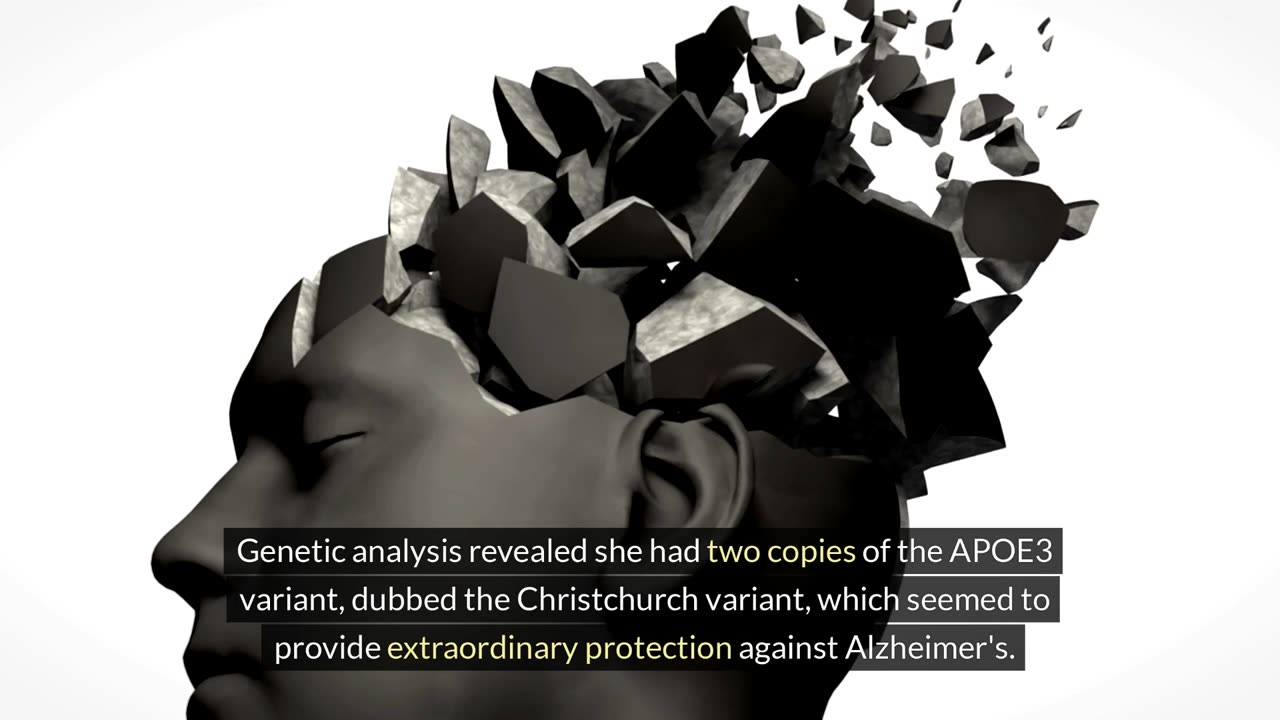Premium Only Content

Can a Newly Discovered Genetic Trait Delay Alzheimer's?
A Breakthrough Discovery in Alzheimer's Research
Imagine a world where the onset of Alzheimer's disease can be delayed, giving individuals more time to live their lives fully before the devastating effects of the disease take hold. Recent research has brought us one step closer to this reality. A study published in The New England Journal of Medicine has uncovered a rare genetic trait that could delay the onset of Alzheimer's in people who are at high risk. This finding not only offers hope but also opens new avenues for the development of groundbreaking therapies.
## The Remarkable Case of the Colombian Family
### Why Colombia?
The focal point of this groundbreaking research is a large extended family in Colombia. More than 1,000 members of this family carry a genetic mutation that makes them almost certain to develop early-onset Alzheimer's disease, typically beginning in their mid-40s. This mutation, known as the Paisa mutation, has been passed down through generations, affecting numerous family members.
In the 1980s, neurologist Francisco Lopera from the University of Antioquia discovered this family's plight. His work led to the identification of the Paisa mutation, providing a unique opportunity to study Alzheimer's in a population with a high genetic predisposition to the disease.
### The 2019 Breakthrough
In 2019, researchers made a remarkable discovery within this Colombian family. They found a woman who carried the Paisa mutation but did not show symptoms of Alzheimer's until her 70s, about 30 years later than other family members with the same mutation. This delay was attributed to her carrying two copies of a rare genetic variant called Christchurch, named after the place where it was first identified.
## What the Latest Study Reveals
### Examining the Christchurch Variant
The recent study built on the 2019 findings by examining whether the Christchurch variant could provide additional protection to those with the Paisa mutation. Researchers from the University of Antioquia in Medellin conducted detailed medical studies on family members from 1995 through 2022. They collected extensive data, including medical exams, genetic testing, and neuropsychological assessments.
The study focused on 27 individuals who carried both the Paisa mutation and one copy of the Christchurch variant. These individuals showed signs of Alzheimer's disease later than those who only had the Paisa mutation. Specifically, while the Paisa-only group began showing symptoms at a median age of 47, those with both Paisa and Christchurch did not exhibit memory and thinking problems until the median age of 52. This five-year delay provides significant insight into the potential protective effects of the Christchurch variant.
## Implications for Drug Development
### Harnessing the Protective Effects
The findings of this study are not just an academic curiosity—they hold real potential for the development of new Alzheimer's treatments. Dr. Joseph Arboleda-Velasquez of Mass General Brigham, a co-author of the study, emphasizes the importance of leveraging these discoveries to develop therapies that could benefit everyone.
Arboleda-Velasquez's laboratory at Harvard Medical School is already working on developing antibody drugs based on these findings. The goal is to begin testing these medications in human clinical trials by 2026. This approach aims to replicate the protective effects of the Christchurch variant, potentially delaying the onset of Alzheimer's in at-risk individuals.
### The Role of APOE
Another critical aspect of this research involves the gene APOE, which plays a significant role in Alzheimer's disease. The Christchurch variant is a rare form of the APOE3 gene. Understanding how APOE interacts with the hallmarks of Alzheimer's, such as beta-amyloid plaques and tau tangles, could lead to new therapeutic targets.
Dr. Eric Reiman of the Banner Alzheimer’s Institute, a co-author of the study, underscores the importance of further research into APOE. He believes that targeting this gene could be a promising strategy for treating and potentially preventing Alzheimer's disease.
## The Future of Alzheimer's Research
### Moving Forward
The discovery of the Christchurch variant's protective effects is a significant milestone in Alzheimer's research. It provides a tangible example of how genetic research can lead to potential breakthroughs in disease prevention and treatment. The next steps involve translating these findings into practical therapies that can be tested in clinical trials.
### The Broader Implications
This study also highlights the importance of global collaboration in medical research. The unique genetic makeup of the Colombian family provided crucial insights that may not have been possible in other populations. Such collaborations can accelerate the discovery of new treatments and improve our understanding of complex diseases like Alzheimer's.
A Glimmer of Hope
The possibility of delaying Alzheimer's disease by leveraging genetic discoveries offers a glimmer of hope for millions worldwide. While there is still much work to be done, the findings from the Christchurch study represent a promising step forward. Researchers are optimistic that these insights will lead to the development of effective treatments that could transform the lives of those at risk for Alzheimer's.
If you found this article informative and inspiring, please like, share, and subscribe to our channel for more updates on the latest in medical research and health news. Join the conversation in the comments below and let us know your thoughts and questions about this groundbreaking discovery. Together, we can stay informed and support the fight against Alzheimer's disease.
-
 LIVE
LIVE
Jeff Ahern
1 hour ago $0.13 earnedThe Sunday Show!
11,006 watching -
 LIVE
LIVE
Esports Awards
1 hour agoEsports Awards: Decade Awards 2025
113 watching -
 LIVE
LIVE
Major League Fishing
2 days agoLIVE! - Fishing Clash Team Series: Challenge Cup - Day 1
3,814 watching -
 8:31
8:31
MattMorseTV
1 day ago $1.48 earnedTexas just did the IMPOSSIBLE.
59.1K83 -
 LIVE
LIVE
Rotella Games
18 hours agoGreen Hell Day 6 | We Have a LONG Way to Go
181 watching -
 LIVE
LIVE
Lofi Girl
2 years agoSynthwave Radio 🌌 - beats to chill/game to
249 watching -
 41:26
41:26
The Mel K Show
5 hours agoMel K & Clay Clark | Financial Success Hides Behind Self Discipline: Five Pillars | 8-24-25
22.6K3 -
 LIVE
LIVE
The Rabble Wrangler
13 hours agoThe Best in the West Plays Battlefield 2042 | Road to BF6 Grind
40 watching -
 LIVE
LIVE
JTtheSG
2 hours agoBack To The Deadzone!!!
109 watching -
 LIVE
LIVE
The Official Steve Harvey
13 days ago $5.14 earned24 HOURS OF MOTIVATION w/ STEVE HARVEY
281 watching